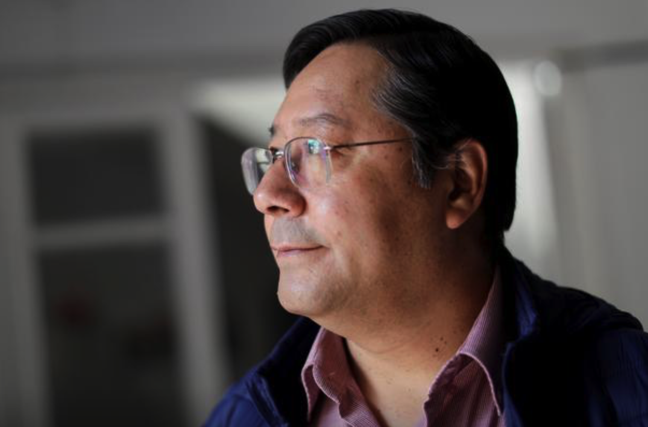
(above) Exit polls in Bolivia signaled a clear victory for Luis Arce, the presidential candidate of the Movement to Socialism party. (Ueslei Marcelino/Reuters)
Bolivia reclaimed its democracy, but big challenges remain for the victorious socialists
October 20, 2020 - Original article: Washington Post
Gabriel Hetland
Bolivia’s nightmare may be coming to an end. If exit poll results are confirmed, the party of the deposed former president, Evo Morales, the Movement Toward Socialism (MAS) has just scored a massive victory, with the former minister of finance, Luis Arce, set to become Bolivia’s next president.
It seems like Arce won an outright majority with 52 percent of the vote, besting second-place finisher Carlos Mesa by more than 20 points. In his first speech following the election, Arce proclaimed, “We have recovered democracy.”
Thanks for this outcome are due not to the Organization of American States or U.S. government. Alongside the Bolivian right, these are the principal forces that ended Bolivian democracy by supporting the November 2019 coup that deposed Morales and brought a brutal right-wing authoritarian regime to power. Credit for the restoration of democracy goes to Bolivia’s resurgent social movements, which mobilized for weeks this summer to ensure that the twice-delayed election would finally be held. Credit is also due to the courage of Bolivia’s citizens, who defied the de facto regime’s racist fearmongering and displays of military might to vote MAS back into office. In addition to winning the presidency, MAS also appears set to win a Senate majority.
How should we interpret MAS’s crushing victory?
In addition to signaling the return of Bolivian democracy, the results are a resounding repudiation of the racism, repression and ineptitude of the de facto Jeanine Áñez regime. After swearing herself in as president, Áñez infamously declared, “The Bible has returned to the palace.” The day after Arce’s victory, more than a hundred of his supporters chanted, “The pollera will be respected!” referencing the traditional skirt of Indigenous women. Áñez’s reaction to MAS’s victory has been confusing. Two early positive signs are Áñez’s swift recognition of Arce’s victory and her firing of the minister of government, Arturo Murillo, who called MAS supporters “terrorists” and “animals,” and oversaw the brutal crackdown on dissent that left about two dozen dead in November. Yet in a disturbing and head-spinning move on Monday, Áñez brought Murillo back into her cabinet.
MAS’s victory is also a vindication for Morales. It is clear Bolivians want a return to the policies Morales pursued in office. Arce oversaw Morales’s economic policies, which brought 14 years of sustained growth. This facilitated massive reductions in poverty and inequality, achieved through a variety of innovative redistributive social programs.
A comparison between this and last year’s elections suggests, however, that voters are more committed to Morales’s program than to Morales himself. Per official results, Morales won 47 percent of the vote in 2019, 5 percent less than Arce’s apparent tally. The most likely reason for Morales’s failure to score an outright majority last year was the widespread, though far from universal, rejection of his controversial decision to stand for reelection after losing a 2016 referendum to allow the president to run for a fourth term. It is also possible Arce benefited from the widespread disgust provoked by Áñez.
Going forward, Arce faces four major challenges. The first is covid-19, which has killed more than 8,500 Bolivians, giving Bolivia the fifth highest per-capita death rate in the world. The second is Bolivia’s economic crisis. On one hand, there’s the damage wrought by the pandemic, which as elsewhere led the government to shut down much of Bolivia’s economy and society for months. This is compounded by Áñez’s neoliberal policies, which Arce argues led to a 5.6 percent reduction in Bolivia’s economy between November 2019 and March 2020, before the pandemic hit.
The third challenge is securing justice for victims of the Áñez regime. This includes not only the two dozen killed in November 2019, but the hundreds more tortured, illegally detained and persecuted throughout Áñez’s time in office. There is no way to bring back the dead or undo other harms, but those responsible must be held accountable.
The final challenge concerns Arce’s relationship to Morales and his complicated legacy. Arce will attempt to restore the policies that brought millions out of poverty. But he will do so in a notably different context than the commodity boom that coincided with Morales’s first decade in office.
Arce must also grapple with three major shortcomings of the Morales years: the centralization of power around Morales himself; the Morales administration’s co-optation of social movements, which had the ironic and unintended effect of hollowing out the social base that undergirded his initial ascent to office; and, relatedly, the Morales administration’s alliance with agro-industry from 2011 on, which marked a 180-degree turn from the government’s initially robust support for land reform and was taken by many to signal its prioritization of staying in office over real change.
To effectively confront these challenges, Arce would be wise to return to the roots of MAS as a social-movement party committed to radical democracy and far-reaching transformation.
Gabriel Hetland: Bolivia is falling into the grips of a brutal right-wing regime
Álvaro Vargas Llosa: The Bolivian ‘coup’ that wasn’t
Gustavo Flores-Macías: Latin America’s generals, back in the political labyrinth